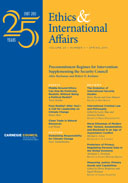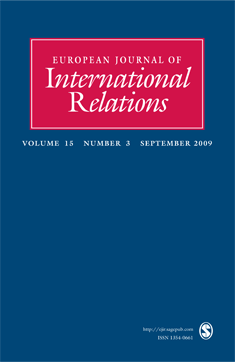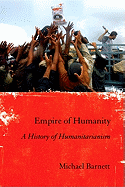
Proponents of humanitarian intervention argue that it responds to a fundamental moral imperative, the prevention of human suffering. The Responsibility to Protect (R2P) — which obliges states to protect their own populations and the rest of international community to hold to them to their word — was unanimously adopted at the 2005 UN World Summit and has become part of everyday diplomatic discourse.
Yet for all its moral urgency, critics point out that humanitarian intervention undermines the sovereignty especially of weak states and has imperialistic overtones. Or, on the other hand, that it too often amounts to little more than empty rhetoric, offering little protection to the vulnerable.
Profound disagreements also exist about the proper application of R2P. Russia invoked R2P in relation to Georgia, but the principle has yet been applied in the context of Sudan or Somalia.
This syllabus will introduce you to one of the most contentious topics in international politics.
Recent Journal Articles
| Precommitment Regimes for Intervention Allen Buchanan, Robert O. Keohane Ethics & International Affairs Vol. 25, no. 1, 2011 |
| A Response to Precommitment Regimes for Intervention Aidan Hehir Ethics & International Affairs Vol. 25, no. 1, 2011 |
| The Antecedents of Sovereignty as Responsibility Luke Glanville European Journal of International Relations Vol. 17, no. 2, 2011 |
| A New Lease on Life for Humanitarianism: How Operation Odyssey Dawn Will Revive RtoP Stewart Patrick Foreign Affairs March 24, 2011 |
| On Humanitarianism Michael Walzer Foreign Affairs July/August, 2011 |
 |
International Ethics and the Responsibility to Protect Michael W. Doyle International Studies Review Vol. 13, no. 1, 2011 |
Other Essays
| “April 2011 or April 1994?” Steven Costello Carnegie Council April 1, 2011 |
“Libya’s Escalating Drama Reopens the Case for Liberal Intervention” Timothy Garton Ash The Guardian March 3, 2011 |
|
| “The Brutal Truth” Stewart Patrick Foreign Policy July/August, 2011 |
“When to Intervene” Scott Malcomson New York Times December 12, 2008 |
New and Upcoming Books
| Armed Humanitarians: The Rise of the Nation Builders Nathan Hodge; Bloomsbury, 2011 Click here to read a review |
|
| Empire of Humanity: A History of Humanitarianism Michael Barnett; Cornell University Press, 2011 Click here to read a review |
|
| Humanitarian Intervention: A History Brendan Simms; Cambridge University Press, 2011 Click here to read a review |
|
| International Authority and the Responsibility to Protect Anne Orford; Cambridge University Press, 2011 Click here to read a review |
|
| Global Politics and the Responsibility to Protect Alex Bellamy; Routledge, 2011 Click here to read a review |
|
| The Responsibility to Protect: Norms, Laws and the Use of Force in International Politics Ramesh Thakur; Routledge, 2011 Click here to read a review |
Books being taught*
Reading Humanitarian Intervention
Anne Orford
Cambridge University Press, 2003
Arguing about War
Michael Walzer
Yale University Press, 2004
Saving Strangers: Humanitarian Intervention in International Society
Nicholas Wheeler
Oxford University Press, 2000
Humanitarian Intervention
Terry Nardin & Melissa Williams
New York University Press, 2006
The Purpose of Intervention: Changing Beliefs about the Use of Force
Martha Finnemore
Cornell University Press, 2003
Humanitarian Intervention and International Relations
Jennifer Welsh
Oxford University Press, 2006
The Ethics and Politics of Humanitarian Intervention
Stanley Hoffmann , Robert Johansen, James Sterba
University of Notre Dame Press, 1996
*Selected from Geneva Graduate Institute of International and Development Studies.
Classics
Just and Unjust Wars
Michael Walzer
Perseus, 2000
State Sovereignty as Social Contract
Thomas Bierstecker and Cynthia Weber
Cambridge University Press, 1996
The Law of Peoples
John Rawls
Harvard University Press, 1999
Political Theory and International Relations
Charles Beitz
Princeton University Press, 1979
Liberalism and the Limits of Justice
Michael Sandel
Cambridge University Press, 1998
The ISN’s own Digital Library contains further reading:










